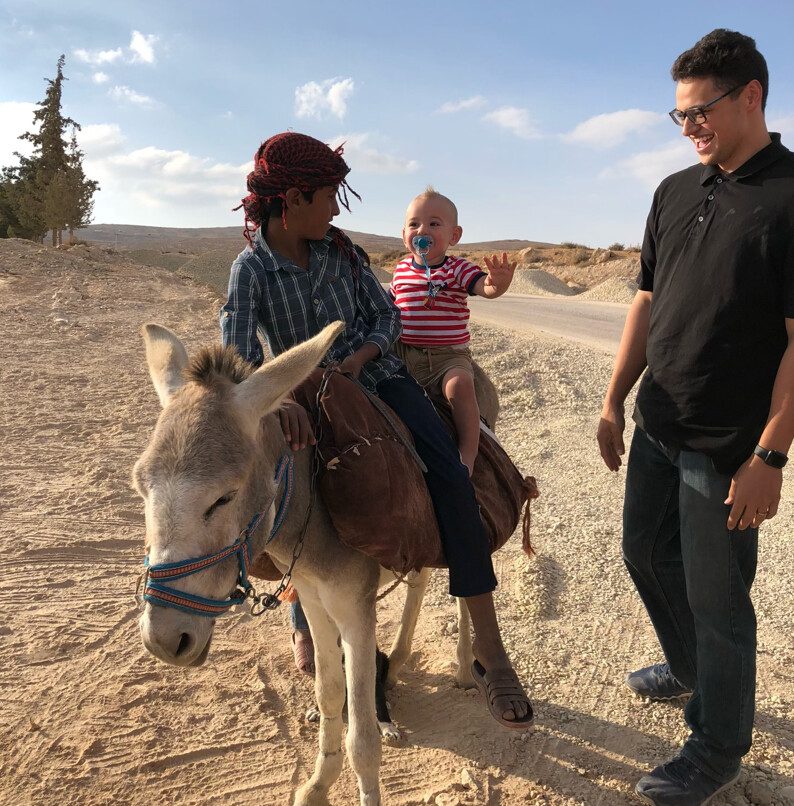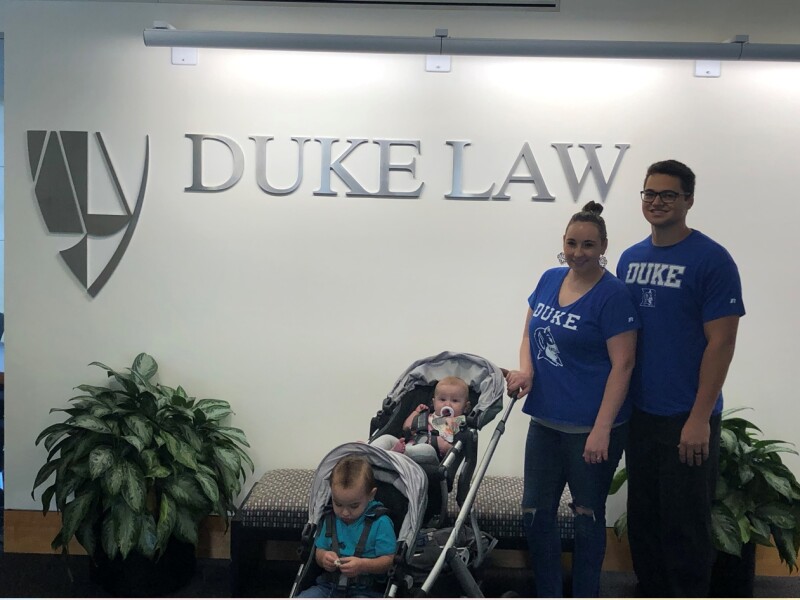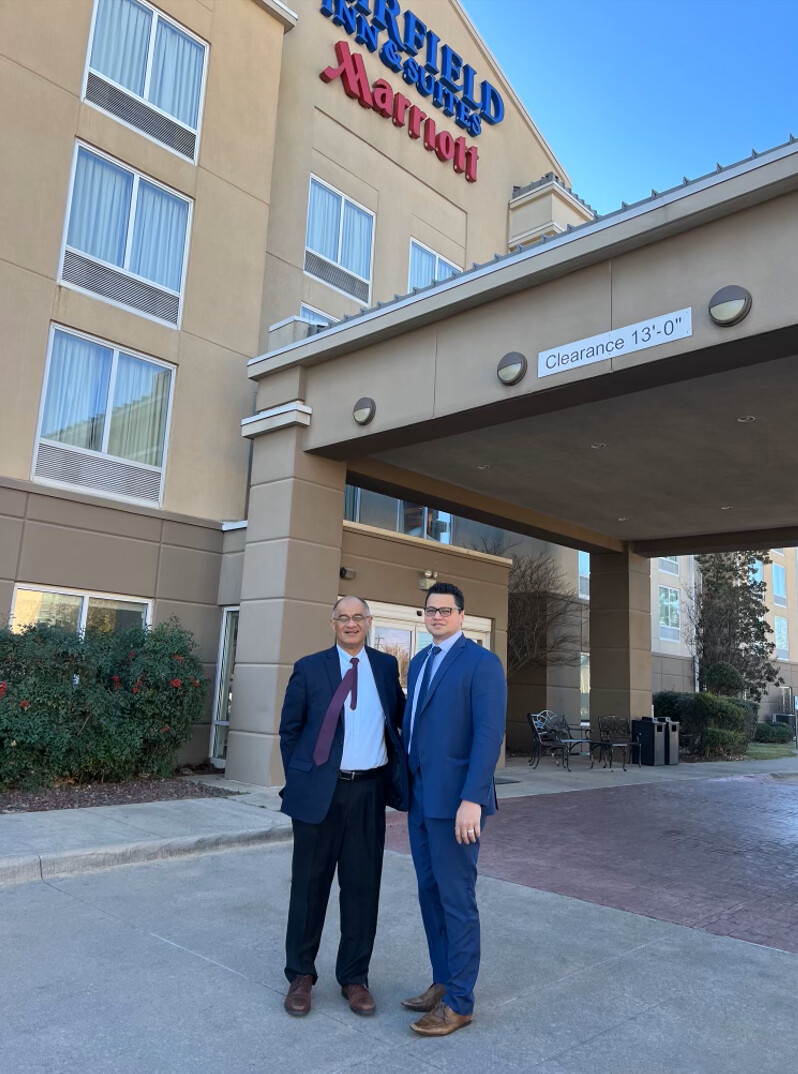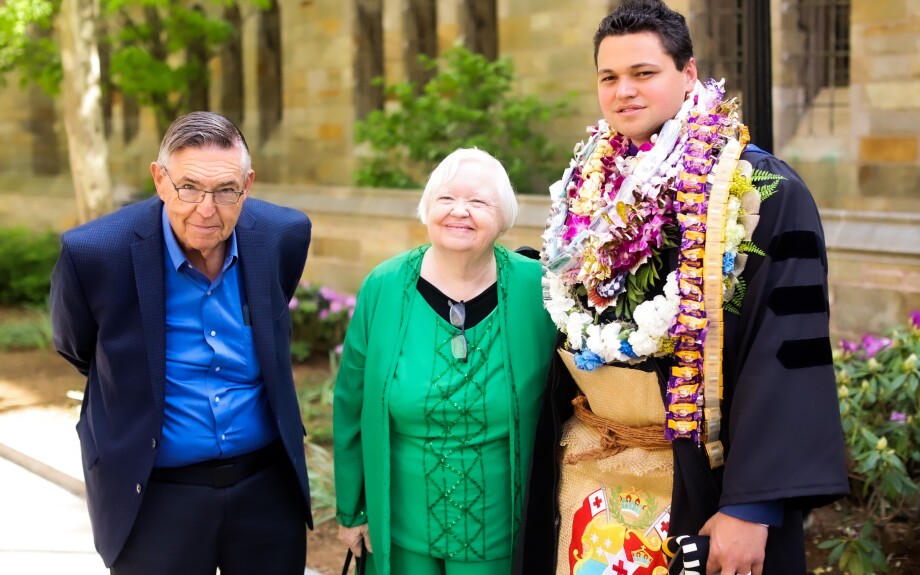The audience at Yale law school’s 2022 commencement ceremony may not have been ready for the explosion of cheers that erupted as Latter-day Saint Koloa Ha’afuluhao Wolfgramm received his diploma. Heads turned as 87 members of the Wolfgramm family clapped and hollered in honor of their new graduate. And the family was excited for good reason—Koloa, 26, is the first-ever Pacific Islander to graduate from Yale Law.
Watch the exciting moment from another angle and see the family, including Elder Vai Sikahema, General Authority Seventy and Koloa's first cousin, let their contagious excitement loose.
Yale consistently ranks as the top law school in the country, and, like other universities, it tracks the graduation rates of six racial groups. Until this spring, the Native Hawaiian/Pacific Islander group was the only category that had yet to have someone graduate from Yale Law. But now Koloa proudly holds a diploma that means all the more to him when he thinks of his community.
“Leading up to graduation I was often asked how I felt,” Koloa wrote on LinkedIn. “To be honest, I didn’t feel strongly about it until I walked across the stage to the thundering roars of nearly a hundred of my family members who had flown from all across the country to celebrate the first Pacific Islander to graduate from Yale Law. I felt a deep sense of love and appreciation for my family and what my ancestors sacrificed so that I could be here. This is a family accomplishment more than an individual one.”
Koloa’s very name holds significance for his family and for the Tongan community: “Koloa” is the name of the island his family comes from in Tonga, an island about the size of three football fields that consists of a small cemetery, approximately 15 houses, and a beach. Koloa’s grandparents left the island to seek the educational opportunities Koloa has now achieved.
“For us, this is really bridging the gap between corporate America and Pacific Islanders,” Koloa’s wife, Rebecca, says. “And that is really, really special to us.”
Koloa hopes his graduation will contribute to an elevated perception of the Polynesian community in America. He notes that many Americans are quick to associate Polynesian culture with sports and entertainment, but not as frequently with academia.
“Perhaps Polynesians will not just be known for being animals on the gridiron, but also in the classroom,” he told LDS Living.
Koloa’s path to Yale’s commencement stage is an interesting one. From losing a leg to childhood cancer, to discovering a passion for Arabic and being invited to move to Jordan, to serving in a bishopric during his first year of law school, his life has been full of the unexpected. But it seems that’s exactly what he is suited for.
“My husband has never been afraid to be an outlier. He’s not afraid to stand up for what he believes in. He’s not afraid to go against the status quo,” Rebecca says. “He’s always prioritized serving the Lord or His fellow man over doing anything for himself.”

A Passion for Law
Koloa was diagnosed with bone cancer when he was 4 years old. He overcame the disease, but complications in his right leg required it to be amputated when he was 13 years old. Through his teens, Koloa pushed the perceptions of what amputees can do. When he was 16, he joined the USA Para Bobsled team, the first national team for the sport. He also joined a group of fellow amputees who preferred to play basketball standing up, rather than in wheelchairs. His team formed a non-profit and traveled around the country playing basketball against able-bodied teams, doing NBA halftime shows, and talking to other amputees.
He set sports aside, however, to serve in the England London South Mission, where he was originally called to speak English but was asked to learn Mandarin after he arrived. While he was excited to serve, there was some concern over how well his body would hold up with the hours of walking and standing required by full-time proselyting missionaries.

“I was given a blessing before I went out that every morning that if I’d worked hard the day before that my leg would be healed each and every morning. On those nights where it was really painful, I’d wake up the next morning and the leg would be completely fine. That was a big testament to me that the Lord knows who we are, knows what we’re doing, and knows what we’re capable of,” Koloa said in a video about his early life.
The Lord knew Koloa was capable of great things in the future. When Koloa began his mission, he had in mind that he wanted to be a surgeon one day. His mission president in London was a heart surgeon, however, and through conversations with him, Koloa realized his interests lay more in discussing ideas and in seeing how law affects the world. And so, at the conclusion of his mission, he began to prepare for law school by attending Brigham Young University for his undergraduate degree.
After sitting in on an Arabic 101 class that a friend was taking, Koloa felt strongly he should study Arabic for his undergrad—and discovered he had quite the affinity for the language. After enrolling in and completing that 101 class, Koloa skipped several courses and took a fourth-year class the next semester. Soon after, he received an invitation to travel to Jordan with other advanced Arabic students from BYU to participate in a humanitarian pilot program. So with a week’s notice, he and Rebecca, who he had married seven months after returning from his mission, flew to Jordan and spent seven months there. He studied at an Arabic language institute and they both served in church capacities.

“It was a great experience. It felt like being on a mission in a lot of ways because we got to spend all of our time engaging with the community and assisting with the church’s humanitarian efforts,” Koloa says, adding that their time in Jordan was also beneficial to his legal pursuits. “It’s a valuable experience seeing how the laws work in a non-Judeo-Christian country. Because a lot of our laws are based in Judeo-Christian values. So you go to a country that has a different basis for their laws, and their religion, and their culture, and you start to see differences, and you think about why there are differences.”
A broadened perspective wasn’t the only blessing to come from Koloa’s time in Jordan; he was able to comfortably have one of his law school interviews in Arabic. After graduating with his bachelor’s degree in Arabic and Middle Eastern Studies in 2019, Koloa was accepted to Duke University’s law program, where the Lord had a work for him to do before Koloa would make his way to Yale.
An Unexpected Call
Rebecca and Koloa had two children when they arrived in North Carolina for Koloa’s first year of law school. The ward they had been living in was large (they describe it as having 200–300 active members), so they were shocked when Koloa was called to serve in the bishopric shortly after moving there.
“I don’t even know if I knew which person on the stand was the bishop when we got the call,” he says. “But my wife and I made a promise when we got married that we would do what the Lord asks, regardless of where we were or what we were doing when He asks. We would use His timing as our guide instead of our own.”
The next year was busy. Rebecca would drop Koloa off on campus at 8 a.m. and pick him up at 5 p.m. Tuesday nights and Sundays were totally dedicated to Church service. But the rest of his free hours Koloa devoted to his family.
“Evenings and Saturdays were boxed off for family—that was always really held sacred. Other things weren’t allowed to encroach on that unless there was a huge emergency or something,” he says. “Going home and putting away the books and playing with the kids, watching a show with them or having dinner together—that provided a needed break to the brain.”
Rebecca was a stay-at-home mother during that time and looks back in awe at how the Lord took care of them.
“I would be wrong to say that it wasn’t really challenging at times, having to take care of the kids a lot when he’s studying for finals. But it was pretty incredible to see how as long as we prioritized our marriage and family where possible, the Lord blessed us significantly. He blessed me with more patience than I’ve ever had in my life,” she says.

Their dedication to family and the gospel paid off: Koloa did so well during his first year of law school (which is infamously the most difficult) that he was able to transfer to Yale, with its more prestigious program, for the remaining two years. As he left Duke and the ward there, he looked backed on his year of church service with gratitude.
“I think that I did as well as I did at Duke maybe not in spite of, but because of, my service in the bishopric,” he says.
A Wolfgramm Future
Now that law school is over, Koloa looks forward to continuing to build up the company he, his father, and uncle started last year, Wolfgramm Capital, a real estate private equity firm specializing in value-add hospitality investments. In the past six months, the company has purchased $60 million in real estate and has another $100 million under contract set to close this year, an accomplishment Koloa never could have imagined as a child.
“Growing up, my dad worked in hotels doing night audits, as a shuttle driver—everything. So I was raised, basically, in hotels for significant portions of my childhood. I remember waiting for movies to come out so we could watch it for free at the hotel, because we couldn’t afford to go to the movies. I remember eating a steak for the very first time ever at a hotel because we got a discount because my dad worked there,” Koloa says. “And what we do now is we actually buy hotels, and we manage them and run them. And in some ways it feels full circle.”
As Koloa thinks about the future of his company, he is excited about the opportunity to connect with the Polynesian community in America.

“What we're starting to see now is you have significant portions of the Polynesian population, whether it’s from sports, or tech, or whatever, that are the first generation to ‘make it’, and they’re looking for investment opportunities,” Koloa says. “And they typically would have been barred because they might not have a huge network to access a private equity investment vehicle. So one of our big company ethos has been that we would also allow, specifically, those who come from our communities—you know, fellow Polynesians who qualify under the applicable securities laws—to invest with us. We’ve found people who’ve never had the opportunity to invest in a private equity deal. And that does, frankly, give us a ton of satisfaction that we create value that’s captured by our community.”
Koloa’s vision for Wolfgramm Capital captures an aspect of Polynesian culture that Rebecca has come to love since marrying Koloa.
“Everyone is willing to lift others, in the sense that if someone else is succeeding, they see it as a success for each one of them. They don’t see Koloa’s success as taking away from them, but also building them up. They see each other truly as an entire family, and they want to see others succeed,” Rebecca says.
She witnessed that support at a graduation party thrown in Koloa’s honor: The family participated in a lei ceremony honoring the women in Koloa’s life and a video was shown of him and his siblings reciting Robert Frost’s poem “The Road Less Traveled,” which their father insisted that they memorize as children. A musical number was performed by aunts and cousins, the children performed a traditional Tongan dance, and speeches were given by multiple family members, all while everyone enjoyed dinner together.

Surrounded by loving family, Koloa is reminded of the phrase he became familiar with during his time as a missionary in England—a phrase that will continue to guide him in the future.
“There’s a great little inscription that runs around the outside of the two-pound coin in England, and it says, ‘Standing on the shoulders of giants.’ I think that’s been true for me in my life. Being able to hopefully fulfill what my immigrant ancestors wanted is special to me,” Koloa says. “I have no qualms in saying that a lot of things that I’ve been able to do is because of good decisions made by the people around me: my parents, grandparents, uncles and aunts, cousins—those who encouraged me.”
With all the family support that helped make Koloa’s graduation possible, it seems perfectly fitting that in announcing his graduation on LinkedIn, Koloa ended his post with this simple phrase:
“Ivy League, meet the Wolfgramms.”
▶ You may also like: From heroin addict to scholar: Latter-day Saint Ginny Burton shares how faith was vital in her recovery, success






